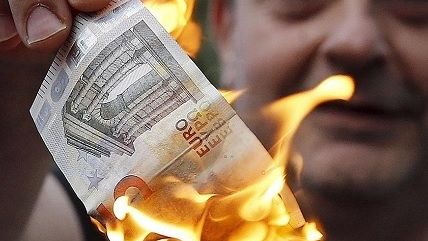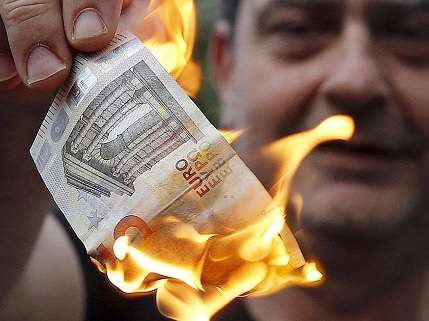5 Things You Need to Know About the Shitshow in Greece
Greeks want big government but they want someone else to pay for it.


The Greeks Have a Loan Payment Due Tomorrow They Are Not Going to Make
Last week, the Greek government walked away from the negotiating table with its creditors and enablers—the European Commission, the European Central Bank, and the International Monetary Fund, called the "Troika." The group wanted Greece to commit to more spending cuts and not just more tax hikes as a condition of receiving more bailout money with which they could keep paying off their debts. The Greek prime minister, 40-year-old Alexis Tsipras, who was elected in a snap election in January promising less austerity but also that Greece would remain in the euro, said he would leave the decision to accept the bailout terms to Greek voters, scheduling a referendum for July 5. But Greece's next payment, $1.8 billion to the IMF, is due tomorrow—the country says it will not be making that payment, which have pushed global markets into a downward slide today. Greek citizens have been queuing up at ATMs for weeks, and this weekend the government finally announced banks would be closed all week. But public transportation in the city will be free.
Tsipras, as well as proponents of a "NO" vote on the bailout insist it's possible for Greece to remain in the European Union—they're betting that Greece's creditors will come back with a better deal if this one is rejected at the ballot box. Europe's political leaders have insisted that's not the case—that the deal on the table, requiring pension and labor market reforms, was the best Greece was going to get. Those reforms are likely necessary for any kind of substantive economic recovery that could bring Greece back to a level where it's a healthy member of the European Union. That's important because…
The EU is a Political and Monetary Union, Not a Fiscal One
For nearly the first decade of the 21st century, the European Union tried without success to get its member states to accept a Constitutional treaty that would further integrate the EU's political system and settle important issues like the supranational organization's official anthem and flag. The euro currency, the apex achievement of the European project, created a monetary union, eventually bringing 19 out of the 28 EU countries under a single currency and a single central bank. But each country retained its own fiscal policymaking power—crucially without the ability to print money that can help government spend a lot of money without necessarily having to raise taxes at that very moment. In Greece, where tax evasion is a social norm, this tool was particularly important. Greek tax evaders were not tax resisters seeking a more limited government—they supported, and even demanded, more government spending and a larger welfare state even while refusing to pay all their taxes. Now they want other countries in the EU to plug the hole they won't. One study suggested 31 percent of Greece's budget deficit could be covered by taxes on the estimated 28 billion euros in annual unreported income. The same kind of schizophrenic Greek attitude contributed to the current problem in the short term…
Greece Had a Prime Minister Who May Have Been Fixing Things, and Voted Him Out of Office
Last we heard from Greece was in 2011 or 2012, when they were, like now, on the brink of possibly exiting the eurozone. Greece secured a series of loans, agreed to so-called austerity measures, and crisis, for a while, had been avoided. Greece had a prime minister, Antonis Samaras, who came closer than any other in the last 40 years to achieving a balanced budget. Briefly, Greece had the fastest growing economy in Europe. The tax delinquency rate didn't go down, but Greek citizens grew tired of austerity, blaming the European Union for the consequences of their own reckless fiscal policy and politics. Tsipras won a snap election in January in part on a promise to undo the EU-imposed reforms. This would be simple enough if Greece unilaterally decided to exit the eurozone—but Tsipras also promised Greece could stay in the EU. These two promises are virtually mutually exclusive. The EU's reforms are necessary not just to get Greece out of the current crisis but to bring its economy to a caliber that fits with many of the other economies of the Eurozone. What are those reforms?
Europe's Reforms for Greece Ought to Be Pretty Uncontroversial
The Greeks say they want more money from their creditors now without having to make any changes. But they are not being honest and saying outright that they want a handout. They insist on the fiction that the loans will be repaid. Without the reforms Europe is asking for, that is impossible. Greece, for example, has 133 separate government pension funds. The troika wants Greece to simplify its pension system, to stop running deficits in its pension fund, to stop permitting early retirement, and to cut government contributions to pensions. They also want Greece to reverse a minimum wage hike the Tsipras government instituted—a higher minimum wage, of course, keeps more people out of the job market and, and this is especially relevant to Greece, provides more incentive for off-the-books work, from which the Greek government can't extract taxes creditors need it to so that their loans don't become total handouts.
Europeans May Be Losing Patience
While Greece is the economic crisis getting the most international headlines, the entire Eurozone has remained in a bleak economic condition for the last several years. It still has a double digit unemployment rate. Eurosceptic parties have seen their luck turn for the better at the ballot box. The majority of citizens in only two countries—Germany, with the richest economy, and Poland, with the most emigrants sending remittances from the rest of Europe—believe European integration has strengthened the economies of their countries. Arguments about democracy meaning the Greeks are entitled to money from Europeans elsewhere on the continent notwithstanding, European public opinion may be getting weary of the Greek crisis and the Greeks' insistence Europe needs to pay for its bloated welfare state. But Europeans interested in saving Greece can do something about it, without forcing their less interested fellow Europeans to commit their money. An Indiegogo campaign to raise 1.6 billion euros for Greece to make its next loan payment was launched earlier today. It's raised almost 9,000 euros in less than one day, far from the mark but more than most crowdsourcing campaigns raise on the first day.


Show Comments (294)